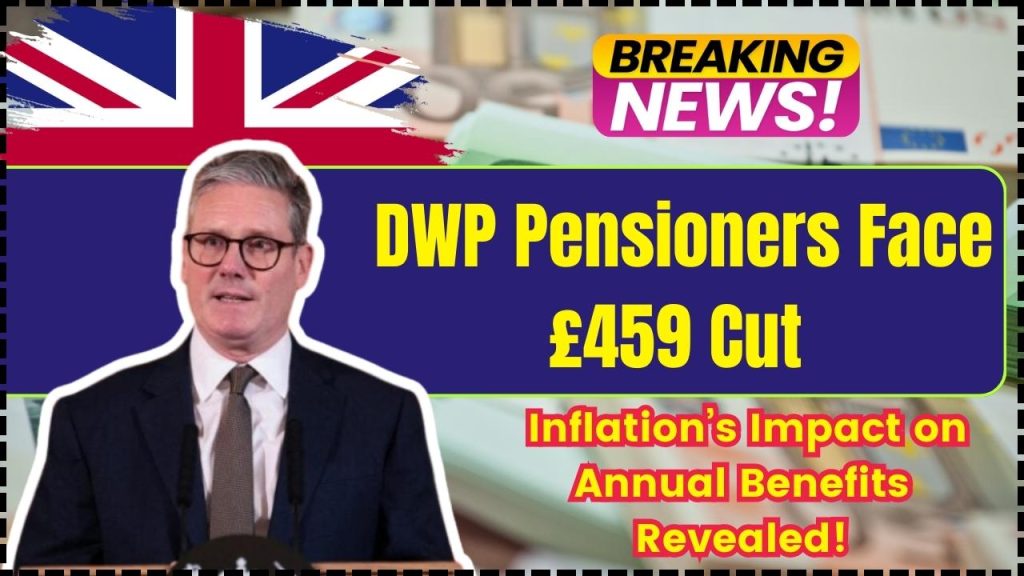DWP Pensioners Face £459 Cut: Rising inflation and recent changes to government policies have placed significant financial strain on pensioners in the UK. Many individuals are now facing a £459 reduction in annual income, primarily due to increasing energy costs and cuts to the Winter Fuel Payment. These changes, introduced by the Department for Work and Pensions (DWP), have sparked widespread concern among pensioners and advocacy groups alike. This article breaks down the reasons behind the reductions, offers practical solutions, and provides key insights to help pensioners navigate these challenging times.
DWP Pensioners Face £459 Cut
The financial challenges facing pensioners due to inflation, rising energy costs, and reduced government support highlight the need for proactive measures. By maximizing available benefits, adopting energy-saving practices, and staying informed, pensioners can better navigate this difficult period. Advocacy groups and policymakers must work together to ensure that the most vulnerable are protected during these challenging economic times. For more information or assistance, visit the DWP’s official website.

| Aspect | Impact | Details |
|---|---|---|
| Energy Price Cap Increase | +£149/year | Ofgem’s updated energy price cap raises average annual energy bills from £1,568 to £1,717, disproportionately affecting pensioners. |
| Winter Fuel Payment Cut | -£300/year | Reduction or elimination of this crucial benefit leaves many pensioners struggling to cover heating costs. (gov.uk) |
| Total Annual Loss | -£459/year | Combined effects of rising bills and reduced government support, leaving pensioners with less disposable income. |
| Pension Credit Uptake | Low Uptake Rate | Despite being available, many eligible pensioners do not claim Pension Credit, missing out on financial relief. |
| Inflation Rate | 6.8% (as of Q3 2024) | Persistent inflation is driving up living costs, particularly for essentials like energy, food, and housing. |
Understanding the DWP Pensioners Face £459 Cut
1. Rising Energy Costs
Energy bills have increased significantly following the latest adjustment to Ofgem’s energy price cap, which limits the maximum amount energy providers can charge customers on default tariffs. From October 2024:
- The average dual-fuel bill (gas and electricity) increased by £149 annually, rising from £1,568 to £1,717.
- Pensioners, who tend to spend more time at home, are disproportionately affected due to higher energy consumption.
Breakdown of Energy Costs (October 2024 Update):
| Energy Type | Price per kWh | Daily Standing Charge |
|---|---|---|
| Electricity | 24.5p | 60.99p |
| Gas | 6.24p | 31.66p |
2. Cuts to the Winter Fuel Payment
The Winter Fuel Payment historically provided pensioners with up to £300 annually to help cover heating costs during the colder months. Recent policy changes have:
- Reduced or eliminated this benefit for many pensioners.
- Targeted high-income households, while leaving others ineligible due to changes in qualifying criteria.
3. Persistent Inflation
Inflation, currently at 6.8% (Q3 2024), has exacerbated the financial pressure on pensioners. Essentials such as food, housing, and healthcare have seen sharp price increases, further reducing disposable income.
Impact on Pensioners: Stories from the Ground
Pensioners across the UK have expressed concerns about how these changes are impacting their lives:
- Margaret, 74: “I’ve had to turn the heating off during the day because I can’t afford the bills. The Winter Fuel Payment was a lifeline, and now it’s gone.”
- John, 68: “My energy costs keep going up, and with inflation, my state pension just doesn’t stretch far enough anymore.”
Advocacy groups such as Age UK and National Pensioners Convention have called for immediate government action, emphasizing that these reductions disproportionately affect vulnerable populations.
Practical Advice for Pensioners
To mitigate the financial strain, pensioners can take several proactive steps:
1. Maximize Available Benefits
- Pension Credit: Ensure you apply for Pension Credit, which provides additional income and unlocks other benefits like free TV licenses for over-75s.
- Cold Weather Payments: Check eligibility for Cold Weather Payments, which provide £25 for each 7-day period of exceptionally cold weather.
2. Manage Energy Costs
- Switch Providers: Compare energy tariffs and switch to a cheaper provider if possible. Use Ofgem’s approved comparison tool for guidance.
- Energy Efficiency Upgrades:
- Insulate your home to reduce heating costs.
- Replace old appliances with energy-efficient models.
- Install smart meters to monitor energy usage.
3. Seek Local Support
- Local Councils: Many councils offer support schemes to assist with energy bills or provide home insulation grants.
- Charitable Organizations: Groups like Age UK offer financial advice and sometimes emergency support for heating costs.
4. Budgeting and Financial Planning
- Create a monthly budget prioritizing essential expenses like food, housing, and utilities.
- Use budgeting apps or tools to track spending and identify areas for savings.
Government Response and Policy Recommendations
1. Calls for Restoring Winter Fuel Payments
Advocacy groups have urged the government to reinstate the Winter Fuel Payment to its full amount for all eligible pensioners. This would provide immediate relief during the colder months.
2. Additional Energy Subsidies
Experts suggest introducing additional subsidies or targeted support for pensioners, particularly those reliant on state pensions as their primary income source.
3. Encouraging Pension Credit Uptake
The government has launched campaigns to increase awareness and uptake of Pension Credit, yet nearly 30% of eligible pensioners still do not claim this benefit. Simplifying the application process could significantly boost participation rates.
DWP Christmas Bonus 2024: What Benefits You Can Expect and When Payments Will Arrive!
Pensioners to Receive £175 Winter Fuel Boost – Check Eligibility, Date
DWP £1200 Bonus for Universal Credit: Eligibility, Payment Dates, and How to Claim!
Frequently Asked Questions (FAQs)
1. Why are pensioners facing a £459 income reduction?
The reduction results from a combination of increased energy costs (£149) and the loss or reduction of the £300 Winter Fuel Payment.
2. How can I check my eligibility for Pension Credit?
Visit the official Pension Credit page to check eligibility and apply online.
3. What energy-saving measures can I implement?
Consider home insulation, using energy-efficient appliances, and installing smart meters to monitor and reduce consumption.
4. Are there other benefits available to help with rising costs?
Yes, benefits like Cold Weather Payments and Warm Home Discount Scheme can provide additional support during colder months.
5. How can I stay updated on government policy changes?
Follow updates on the official gov.uk website and sign up for newsletters from advocacy groups like Age UK.






